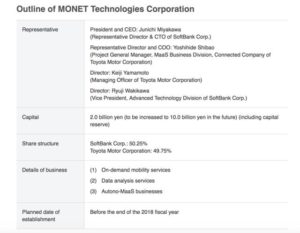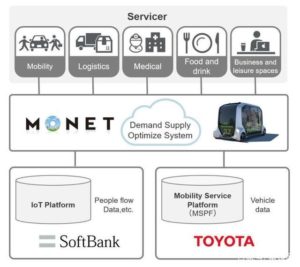Recently, Japanese manufacturers have clearly accelerated their pace. After Honda’s shareholding in Cruise accelerates the autopilot layout, Toyota is also unable to spare.
According to Lei Feng Network’s new smart car (WeChat ID: I-Drive), Toyota wants to build a travel company that integrates autopilot, taxi service and retail delivery, and is willing to endorse the vision of Toyota is Japan we are familiar with. Giants – Softbank.
Perhaps in the near future, Toyota’s e-Palette on display at CES will appear in front of your home.
The new company, which was founded by Toyota and Softbank, was named Monet Technologies (Monet is the Mobility Network, short for mobile networks). In terms of equity, Softbank accounted for 50.25% of the shares, while Toyota held 49.75%.
In specific business, Monet mainly combines the SoftBank data collection and analysis platform “IoT Platform” with the Toyota Motor Information Platform “Mobility Service Platform (MSPF)” to optimize supply and demand, thereby solving travel-related social problems and creating new value. . This is called Autono-MaaS, a fusion of autonomous driving and Mobility-as-a-Service.
At the beginning of Monet’s founding, the two giants will invest 2 billion yen (about 17.54 million US dollars), and will continue to increase 10 billion yen (about 87.72 million US dollars) in the future.
The company’s first phase of operations will officially kick off in 2020 and will launch a taxi service in Japan. Once regulatory barriers are removed, the company will enter the second phase of development, focusing on the deployment of e-Palette, responsible for food delivery, healthcare and becoming a “grocery” for residents of remote areas.
A Toyota spokesperson said that in the initial stage, Monet will focus on the Japanese market and hope to push the service overseas in the future. At the initial stage of the company, Monet’s backbone is 30 employees from Toyota and Softbank, and Softbank CTO Junichi Miyakawa will be the head of the company.
Monet combines Japan’s strongest and most global companies and resources to become a wave of autonomous driving and new travel.
“No matter whether it is Softbank or Toyota, it is impossible to accomplish this task alone, so cooperation is the best way out,” Miyakawa said. “We believe that we can catch up with the forerunners who are going faster abroad.”
As one of the world’s largest automakers, Toyota is preparing for a new business model, and given the fact that there will be fewer and fewer private vehicles in the future, Toyota hopes to secure new sources of revenue through new travel and autonomous fleets.
Softbank, which has great advantages in telecommunications and chips, sees autonomous driving as a natural choice. “The current product can lack the microprocessor,” said Sun Zhengyi, founder of Softbank. “This is an extension of the semiconductor revolution, and many of our roads have finally crossed together.”
“Friends and Alliances”
Japan’s twin giant cooperation is indeed eye-catching. After all, China and the United States have sprung up in autonomous driving in recent years, and Japan’s world-leading automobile manufacturing industry has done nothing. The industry is generally worried that Japan will not catch up with this “window”.
In fact, the day before the marriage between Toyota and Softbank, Honda, another big car in Japan’s auto manufacturing industry, also had a big move. In the future, Honda will invest $2.75 billion in Cruise for the development and deployment of self-driving cars.
The Toyota e-Palette selected by Monet is a fully-automatic driving concept car with 8 wheels, purely electric drive, and looks like a square box to meet people’s work and life needs. The car is an open platform where users can customize different car cases as needed. In other words, it can not only become a mobile office, but also a mobile shoe store or a pizza delivery car.
Toyota Vice President Shigeki Tomoyama also said that Toyota plans to complete the commercialization of e-Palette around 2023. It should be noted that Monet is not a self-driving car developer, but a travel service provider that uses autonomous driving technology.
Sun Zheng believes that “the traditional retail channel is not our first goal because the cost of autonomous driving fleet is too high.”
In fact, Toyota and Softbank have always had a common focus on new travel, and both companies have invested in the taxi giant Uber. In August of this year, Toyota invested US$500 million in Uber, while Softbank became Uber’s largest shareholder at the beginning of this year. In addition, Toyota and Softbank are shareholders of Grab, a Southeast Asian taxi company.
According to Akio Toyoda, Toyota’s numerous vehicles around the world are the company’s biggest advantage, because the data generated by these vehicles can foster new business models. “We have to find new ways to create travel services, and perhaps data collection is one of the best options,” explains Akio Toyoda. “In this process, friends and alliances are becoming more and more important.”
Soft silver’s aggressive offensive
In the past few years, Softbank’s offensive in the field of autonomous driving has been quite aggressive. In May of this year, Softbank fell 225 million US dollars and won 20% of the shares of General Auto Driving.
In addition, according to Lei Feng Network’s new wisdom, Softbank also teamed up with Chinese taxi giants to install a taxi system for taxis and enter Japan, a market that is extremely restrictive for freelance drivers.
At the same time, with the Softbank Vision Fund, it still has multiple blockbusters in the auto and autopilot markets. Softbank’s heavyweights include not only NVIDIA, but also startups such as Auto1 and Mapbox.
In addition to the transportation market, the $100 billion vision fund is fully blossoming in areas such as artificial intelligence, robotics, big data and financial technology.
Sun Zhengyi’s Softbank is also a super empire, not only the top telecom operator in Japan, but also the boss behind the US operator Sprint. At the same time, Softbank also operates Yahoo Japan, and ARM is also the bag of it. In September of this year, ARM introduced a new self-driving car processor focused on network security. Sun Zhengyi also predicted that with the maturity of autonomous driving technology, 40% of the global microprocessor production capacity will contribute to the automotive industry. “We believe that these chips will be installed in the car one by one.”
